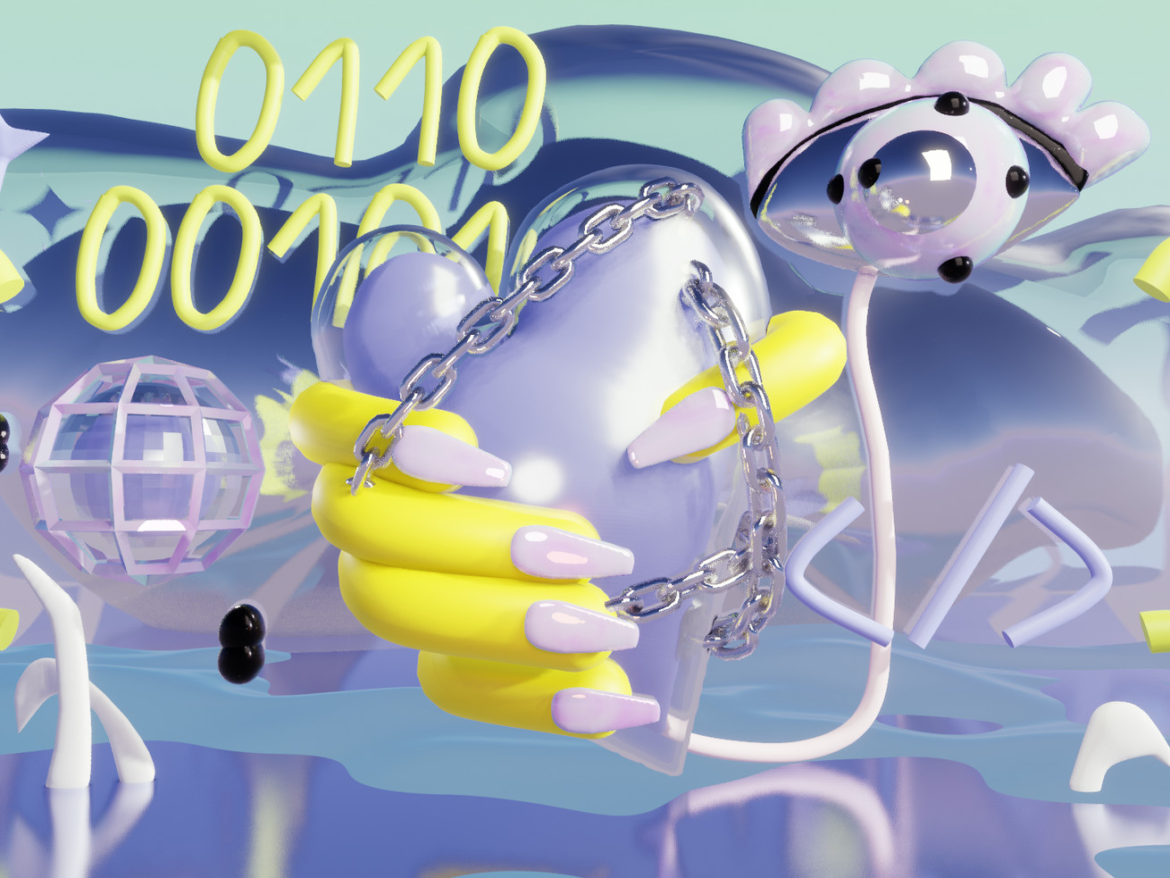We already rely on AI to find our soulmate, and soon we might use it to hack death. But we risk losing what it means to be human.
When I was 17, I left my home in Bangladesh to go to college in the United States. I took three flights, spent 11 hours waiting for a connection at Heathrow Airport, and landed alone at JFK with my visa documents and a suitcase I had borrowed from my grandmother. My parents, back in Dhaka, didn’t hear a word from me until I arrived in my college dorm room in a remote college town in western Massachusetts, more than 7,000 miles away.
After that, we spoke briefly once every other week. I would be awakened by a shrill voice on a landline with the words, “Hello! Trunk call from Bangladesh!” and my parents would check that I was still alive. I would speak briefly about classes, about my professors, about new friends. But I never talked about being lonely or that I didn’t have anywhere to go that first Thanksgiving. Why worry them? My parents did the same, always cheerfully telling me everything was fine, even when it wasn’t.
Today, I still live thousands of miles from my parents and I still only get home once a year. But now we speak, text, and exchange photos on a daily basis. When they don’t hear from me for a few days, they complain about how much time has passed. The distance between us, still identical in miles, has become a different thing altogether. With every text sent, every image uploaded, the space between us shrinks, and our experience of space and time is fundamentally altered.
These technological and relational shifts have happened in my adulthood. I straddled two worlds — before the internet, and after. And now I am about to straddle a third: the age of mechanical intelligence.
I hesitate to call it artificial intelligence because that makes it both more and less scary than it truly is. More, because “artificial” reminds us of robots, of colonization and physical dominance, images that have been emblazoned in our minds through books and film. And, as of right now, the real capability of machine intelligence still falls short of our darkest imaginings. Yet artificial also implies that it is somehow outside of ourselves. And this thing, whatever it is, is not just made by us, but will embed itself deep within us and become part of our most intimate selves.
It is better to think of AI in the phrase the writer Yuval Noah Harari has coined: “inorganic agents.” These inorganic agents will live alongside us, will mirror — and eventually supersede — our intelligence. Along the way, they will transform the things that make us most human: the way we love, and the way we die.
In search of the perfect other
I know I sound like a dinosaur when I tell the details of the story of how I met my husband 20 years ago. That we met in person, in graduate school. That we dated in a cheap Thai restaurant in Cambridge and exchanged elaborate, handwritten letters during a long separation while he was backpacking across Japan — letters that took weeks to arrive. That of course our relationship began this way when there were no dating apps, just advertisements in newspapers that were only for the genuinely desperate or the openly creepy. All relationships happened as a matter of arrangement or serendipity. Other people did the arranging. Fate did the serendipity.
It is now not only conventional to meet on a dating app, it’s practically the norm. One in every five internet users in the US is using a dating app. Globally, there are an estimated 366 million such users. Two-thirds of them are hoping for some kind of commitment (though Tinder, with its roots in casual hookups, is still the most popular, with 72 percent of monthly active users). Almost every single person uses dating apps, and despite the stereotypes, most are looking for the same thing I was in my pre-app youth: love.
All that dating tech is increasingly powered by AI in some form or another. First, there’s the large amount of data that an app gathers from its users, honing its ability to suggest better matches. Once a match is made, there are dating apps that can help you start a conversation with a potential match, giving you prompts and conversation topics — and perhaps in the future, simply writing for you, an AI Cyrano. And then there’s the AI that swipes for you so you can forgo the tedium of scrolling through hundreds of wrong people before you happen upon one that might be a good fit.
I love that dating tech has made it easier and safer for LGBTQ+ daters to find their people. Apps like Feeld give every niche interest, kink, and sexual orientation its own place in the sun, or rather, the algorithm, destigmatizing differences along the way.
But there’s something misleading about optimizing the search for your perfect fit because it suggests that your perfect fit exists. I’m a self-confessed romantic — after almost 20 years together, my husband still gives me all the feels — but anyone who has weathered more than a decade of marriage, of living together and co-parenting, can tell you that relationships are made, not found, despite what we might hope for from AI.
Mechanical intelligence excels at pattern matching; it sees and recreates repeating patterns to a scale that humans could never match. But it is not programmed for the accidental, the unexpected, the often random and illogical ways people find love. My husband was born in rural New Hampshire, homeschooled till the age of 11, and moved to a Buddhist monastery as a teenager. Would any algorithm have possibly matched him to me, raised by Bangladeshi revolutionaries in Paris?
In The Symposium, Plato tells us that humans were created with four arms, four legs, and a head with two faces. Fearing their power, Zeus split them into two separate parts, condemning them to spend their lives in search of their other halves. Thus was born the notion that there is an ideal mate out there for each of us, that if we just search hard enough, we will find them, our matching half, and we will at last feel complete.
The idea of a soulmate — someone who will heal the wound of human nature and take away the pain of being alive — is one of the most powerful ideas ever imagined. It fuels the art we make and the stories we tell. It allows us to imagine ourselves as beings who have the ability to heal ourselves by finding love.
But as romantic and powerful as it is, it is also risky. If all you need to do to have love is simply search for it, you may spend your whole life seeking, rather than making, a life for yourself. You will be swiping left for the remainder of your days.
The inorganic agents at the heart of dating tech, powered by the vast amounts of data they collect, give us the illusion that a perfect mate is just a few swipes away. This doesn’t just mean that we are using new methods to find love, but also that its very definition is fundamentally altered. When we imagine that there is a person out there who matches us so completely that nothing needs to be left to chance, we abandon the less romantic notion that love is made, not born.
I can’t say precisely what this will do to love, but I can say that it won’t be the same. We already know that more people are staying single, that marriage is on the decline, and that some studies are showing that dating is getting harder. Yet there are also studies that show couples who meet online have happier and longer marriages. Perhaps the algorithms just need to get better, and the generations who come after us will seek out their mates with greater determination — and with greater precision. Or perhaps they will be lost in a kind of love limbo, forever seeking, never quite finding, never settling, perpetually adrift in a sea of hope.
Living and dying, again
If mechanical intelligence is already profoundly influencing the way we view our most intimate relationships, the one thing that may be even more impossible to disrupt is death. When I was writing my novel The Startup Wife about an app that replaces religion, I tried to come up with the most outlandish, the most unrealistic startup ideas I could think of. I asked myself, what is the biggest, most sacred thing that tech might try to disrupt? So I made one of the characters plot to “hack death.” In my imagined future, people would be able to converse with their loved ones even after they’d died, using an amalgamation of their emails, texts, and other communications.
It was only a few months after the publication of my novel that I heard Microsoft had already patented a conversational chatbot modeled after any specific person, like a “past or present entity … such as a friend, a relative, an acquaintance, a celebrity, a fictional character, a historical figure.” In other words, thanks to Microsoft’s technology, it seemed we could eventually talk to the dead — or at least a facsimile of them.
Microsoft later announced there would be no plans to turn the patent into a product, with its own general manager of AI programs admitting that the concept was “disturbing.” Yet two years later, a Korean startup called Deep Brain AI launched a product called Re;Memory, which aims to do much the same: create a simulation of a dead loved one.
The advertisement for Re;Memory looks eerily like the trailer for Arnold Schwarzenegger’s 2000 sci-fi movie The 6th Day. An older woman enters a room and sits down. A lifelike image of her dead husband is projected in front of her. He begins to speak, to move. He talks to her, and she begins to cry — not out of grief, but what appears to be relief. She is comforted knowing her husband is safe on the other side. She believes the image speaking to her is really him.
We then see the making of the simulation, a video recorded by the man while he was still alive. “We realize appearance as well as mind of the loved ones,” the subtitle reads. The man then speaks to his daughter. “I’m glad to see you are well,” he says. The idea seems to be that a brief, one-way conversation with a dead relative — like a message given via a spirit medium — will bring solace to the living. It will provide an opportunity for a goodbye, perhaps some kind of end to a lifelong conversation that was abruptly interrupted, as all such conversations eventually are, by death.
I don’t see Re;Memory becoming universally adopted — it just seems so creepy, and in a way, rather fake — but innovations in mixed reality have normalized the concept of the avatar, not as something that is simulated, but as a digitized representation of the self.
But I can imagine a future where that digital representation increasingly becomes the norm, whether we want it or not. Just look at the Apple Vision Pro. At its June launch event, I found myself sucked into its crisp, immersive world. I thought, “Everything that is in front of me will be better with these glasses on. Everything! Why would I ever want to take them off? How could anything be as interesting as Vision OS? If I have two tiny postage stamp-sized televisions mere inches from my eyes, why will I ever want to take them off?”
Instead of picking between the two — the digital or the real — the makers of Vision Pro want to sidestep it by making it okay to wear the glasses all the time. A real person enters the room? Don’t worry, they can still see your eyes! Need to get on a video call? Here’s what they say: “Because you wear Apple Vision Pro, and your eyes are covered, we engineered a system that uses advanced machine learning to represent you realistically when you’re in FaceTime … your persona dynamically reflects your face and hand movements, so when you’re chatting, people see your eyes, hands, and true expressions.”
Which means, essentially, that when you’re on a call with someone, you’re interacting with their very realistic avatar — only now it’s called your “persona.” Something that is meant to be you, just in pixelated form. And once we become familiar with interacting with living people’s personas, perhaps it will be just a short step to keeping in touch with these personas once the body itself is gone. And then we’re back to talking to the dead, thanks to AI.
I would have to be an oracle to be able to tell you what the world will feel like in the future; I can’t even predict the next few months. Even as I write this, I feel it becoming old news, like disappearing ink. So let’s talk about the world that already exists: the present. In this present, you already live in a near-perfect mixed reality, able to alter your perception of the world to make it brighter, bigger, prettier than the physical world. In this world, there is a person out there who is a perfect match, someone who already exists in an ideal form, their character molded to yours as if they were designed for you. And if they die, they will remain with you, in the form of a persona; and if you wished, you could spend your remaining days in their presence, their image as crisp and real as if they were still there, their words so akin to their earthly voice that even you, their intimate, might not know the difference.
And yet, when they were alive, you may have spent more time in your mixed reality than in the world with them, and though you loved them, you may have wondered whether they really were the perfect mate. Maybe you should have kept looking, in case the algorithm got more sophisticated and gave you a better match, because the reality of them was always somewhat less than you had hoped.
I can’t say what will happen, but I can tell you that whatever we may have feared yesterday is already within us today; the mechanical intelligence, the inorganic agent, has never been artificial: It is born out of us and is part of us, for better or worse.
Tahmima Anam is the author of four novels, most recently The Startup Wife. She also works at music tech company Roli.



